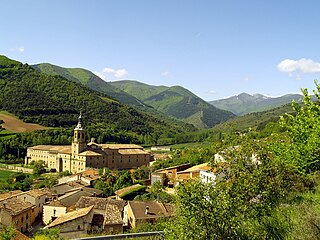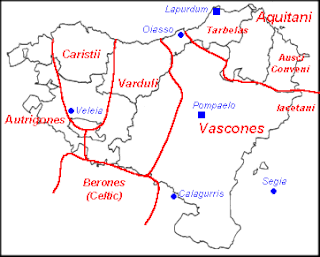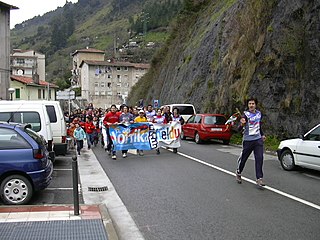 W
WBasque (; euskara, [eus̺ˈkaɾa]) is a language spoken by Basques and others of the Basque Country, a region that straddles the westernmost Pyrenees in adjacent parts of Northern Spain and Southwestern France. Linguistically, Basque is a language isolate. The Basques are indigenous to, and primarily inhabit, the Basque Country. The Basque language is spoken by 28.4% (751,500) of Basques in all territories. Of these, 93.2% (700,300) are in the Spanish area of the Basque Country and the remaining 6.8% (51,200) are in the French portion.
 W
WAezkoa Valley is an administrative unit of Navarre, Spain. It is formed by several smaller municipalities: Abaurregaina, Abaurrepea, Aria, Aribe, Garraioa, Garralda, Hiriberri (town), Orbaitzeta and Orbara.
 W
WAlthough the first instances of coherent Basque phrases and sentences go as far back as the San Millán glosses of around 950, the large-scale damage done by periods of great instability and warfare, such as the clan wars of the Middle Ages, the Carlist Wars and the Spanish Civil War, led to the scarcity of written material predating the 16th century.
 W
WThe Basque–Icelandic pidgin was a Basque-based pidgin spoken in Iceland in the 17th century. It consisted of Basque, Germanic and Romance words.
 W
WJoanes Leizarraga, a Catholic priest who joined the Reformation, translated the New Testament into Basque (1571).
 W
WThe Basque Country is a cross-border cultural region that has a distinctive culture including its own language, customs, festivals, and music.
 W
WErromintxela is the distinctive language of a group of Romani living in the Basque Country, who also go by the name Erromintxela. It is sometimes called Basque Caló or Errumantxela in English; caló vasco, romaní vasco, or errominchela in Spanish; and euskado-rromani or euskado-romani in French. Although detailed accounts of the language date to the end of the 19th century, linguistic research began only in the 1990s.
 W
W.eus is the top-level domain for the Basque language. The abbreviation eus comes from the Basque endonym euskara, meaning "Basque language". Previously to its creation, .eu domain was also used for this purpose, although unofficially.
 W
WEuskaltzaindia is the official academic language regulatory institution which watches over the Basque language. It conducts research, seeks to protect the language, and establishes standards of use. It is known in Spanish as La Real Academia de la Lengua Vasca, in French as Académie de la Langue Basque, in Navarro-Aragonese as Reyal Academia d'a Luenga Vasca and in Gascon as Académia Reiala de la Lenga Basca.
 W
WThe Glosas Emilianenses are glosses written in the 10th or 11th century to a 9th-century Latin codex. These marginalia are important as early examples of writing in a form of Romance similar to Spanish, and in Basque. The anonymous author is assumed to have been a monk at the monastery now known as Suso, one of the twin monasteries of San Millán de la Cogolla . He wrote about a thousand years ago in three languages:A simplified version of Latin The medieval form of a Hispanic Romance language ; Medieval Basque
 W
WBasque is a pre-Indo-European language spoken in the Basque Country, extending over a strip along eastern areas of the Bay of Biscay in Spain and France, straddling the western Pyrenees. It is classified as a language isolate, having no demonstrable genetic relation to any other known language, with the sole exception of Aquitanian, which is generally considered to be an ancestral form of Basque.
 W
WVeleia was a Roman town in Hispania, now located in the Basque Autonomous Community, Spain. The site is located in the municipality of Iruña de Oca, 10 kilometers west of Vitoria. The town was an important station on the Roman road ab Asturica Burdigalam that ran parallel to the coast of the Bay of Biscay. At its apogee, the city could have been inhabited by some five to ten thousand people, and apparently went through different cycles of prosperity and decline into the Early Middle Ages until it was finally abandoned.
 W
WKorrika is an exhibition race held bi-annually in the Basque Country in order to raise funds for the adult Basque-language teaching organization AEK. It is one of the largest demonstrations gathering support for a language in the world, and the longest relay race worldwide, with 2.557 kilometres in 2017, running day and night without interruption for 11 days. The Korrika is celebrated beyond its fundraising goal, encouraging, supporting and spreading the Basque language itself.
 W
WStandard Basque is a standardised version of the Basque language, developed by the Basque Language Academy in the late 1960s, which nowadays is the most widely and commonly spoken Basque-language version throughout the Basque Country. Heavily based on the central Basque dialect, it is the version of the language that is commonly used in education at all levels, from elementary school to university, on television and radio, and in the vast majority of all written production in Basque.
 W
WThe Vasconic substrate hypothesis is a proposal that several Western European languages contain remnants of an old language family of Vasconic languages, of which Basque is the only surviving member. The proposal was made by the German linguist Theo Vennemann, but has been rejected by other linguists.